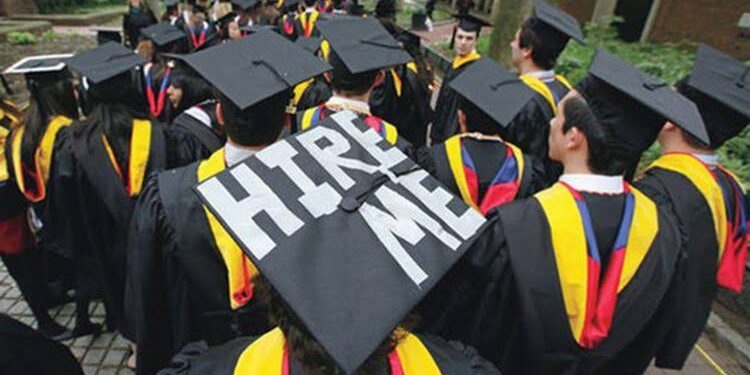
By Gbenga Adebambo
The Guardian
BASICALLY, there are seven reasons why degree holders are poor.
1. THEY DON’T THINK BEYOND THEIR CERTIFICATES
Albert Einstein said, “Education is not the learning of facts, but the training of the mind to think.” Have you ever heard creativity term “Think outside the box”? One of the major reasons why most graduates are poor is simply because they can’t see and think beyond their certificates.
I have seen engineering students work as bankers. I have seen medical doctors with great skills in web and graphic designs. I have seen lawyers that are very dexterous with finances. The list is endless!
The basic truth of life is that the skills that are needed to be much sought after and become more successful in life are not really found within the walls of the classrooms. Your certificate is just a proof that you are teachable, it does not suggest what you are totally capable of doing. You are full of possibilities when you think beyond your degrees and certificates.
2. THEY PRIORITIZE THEIR CERTIFICATES MORE THAN THEIR GIFTS AND TALENTS
I have often advised some of my colleagues, never to leave their gifts dormant while pursuing and hunting for jobs with their certificates. There must be a complementary balance in the pursuit of your passion and in the search for jobs.
Everybody is gifted for something, but the winning edge comes from our ability to work on our gifts and bless the world with it. The very best way to develop yourself is in the direction of your natural talents and interest. In order to live a fulfilled and impactful life, we need to work harder on our gift than our job. We need to discover our gift, develop it, and sell it. Don’t bury your TALENT with your certificates.
3. THEIR CERTIFICATES PREPARE THEM FOR A WORLD THAT NO LONGER EXIST
It has been found that most of the skills taught in schools are becoming obsolete in the present world. The world has changed a lot, and so are people’s need! It is imperative to know that the present form of university education does not prepare students for the future.
Graduates are becoming endangered species in the face of a changing world. Our archaic methods and approaches of learning are preparing graduates for a world that no longer exist, as we are churning out degree holders every year with certificates that have face value but no intrinsic worth. Most learning institutions are filled up with lecturers and pseudo-educators with lecture notes, methods and approaches that have lost relevance in a changing world.
4. THEY KNOW LESS ABOUT THEMSELVES BUT MORE ABOUT THINGS
Certificates and degrees don’t reveal people to themselves; they at most measure our IQ (Intelligent Quotient). I have often tell people that there is no Recovery without Discovery. A poor man is simply someone that has not discovered himself.
The more you discover yourself, the more you realize the treasures that are hidden deep within you. We carry inside ourselves latent treasures that can only be unveiled through self-discovery.
5. CERTIFICATES AND DEGREES CAN KILL INITIATIVES
Degrees and certificates can close up your minds to ideas while initiatives open it up. If you are not careful, your degrees and certificates can close up your mind. The purpose of education is to keep your mind perpetually opened towards limitless possibilities!
Fred Smith saw an opportunity for overnight delivery of anything anywhere in the USA, and ultra-fast delivery anywhere in the world, FedEx was born. It will be interesting to know that Fred Smith got a grade “C” in a Yale economics class for an idea that the professor belittled as unworkable.
Fred Smith’s company became the first American business to make over ten billion dollars in annual profit. Beginning with just 186 packages delivered the first night, FedEx now delivers in over two hundred countries using over 6,030 aircraft, 46,000 vehicles and 141,000 employees.
6. DEGREES AND CERTIFICATES POSITION YOU TO LOOK FOR JOBS AND NOT FOR OPPORTUNITIES
Our certificates and degrees prepare graduates to look for jobs and not open our eyes to life-changing opportunities. You are not poor because you don’t have a job; you are poor because you are not seeing and seizing opportunities.
Being POOR is simply
Passing
Over
Opportunities
Repeatedly
What keeps people ahead in life is not their education or degrees, it is simply the opportunity that they seized. Jobs may be scarce but not opportunities.
As long as there is a problem to be solved, there will always be opportunities. It is a waste of our education, exposure, and experiences if after we graduate from school, all we think about is searching for a job. An enlightened and educated mind should be able to see and seize opportunities.
7. CERTIFICATES AND DEGREES PREPARE PEOPLE TO LOOK FOR SECURITY AND NOT TO TAKE RISKS
We must be willing to make mistakes and take breakthrough risks. Taking risks and learning from mistakes help us in knowing what works and what does not! When Thomas Edison was being questioned by a mischievous journalist on how he felt for having failed for 999 times before getting the idea of the light bulb, his response stunned the whole world when he confidently said, “I have not failed 999 times, I have only learned 999 ways of how not to make a light bulb”.
Many graduates and degree holders are becoming progressively poor because the skills required in the modern world to get rich are not taught in schools and institutions.
By 2025, we’ll lose over five million jobs to automation. This means that future jobs will look vastly different by the time many people graduate from the university.
Future jobs will involve KNOWLEDGE PRODUCTION/CREATION and innovation, and people that are only equipped with skills found in the classroom will definitely be a misfit in an ever-changing world. Skills like critical thinking, creativity, people’s skill, STEM skills (e.g Coding), complex problem-solving skills etc. are central to living a more comprehensive and productive life.
THEREFORE, in conclusion, my humble and candid advice to graduates and students in institutions is to think wide, deep and outside the box. Take voluntary jobs, and don’t be afraid to navigate fields that are different from your field of learning. Your future career will require you to pull information from many different fields to come up with creative solutions to future problems.
Start by reading as much as you can about anything and everything that interests you. Once you get to college, consider double majoring or minoring in completely different fields. Trust me, it’ll pay off in the long run.
Don’t limit yourself to the classroom. Do something practical. Take a leadership position. Start a business and fail; that’s a better entrepreneurship. Contest an election and lose. It will teach you something political science will not teach you. Attend a seminar. Read books outside the scope of your course.
Think less of becoming an excellent student, but think more of becoming an excellent person. Don’t make the classroom your world, but make the world your classroom. Step forward and try something extra.
Invest in something you believe! Real financial security and freedom is not in your job, but in your passion, gifts, talents, and your ability to see and seize opportunities.











